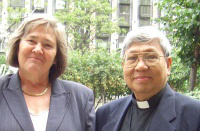Churchs rejoice at ban on open pit mining in Philippine province

MP Claire Short with Bishop Dinualdo Gutierrez
Leaders of the local Catholic Church hierarchy in the Philippine province of South Cotabato have joined with environmental and human rights groups in welcoming a ban on open pit mining. The local government ban, passed on 11 June, is contained in a new Environment Code for the province, located in the Southern island of Mindanao.
Open pit mining involves the extraction of rocks and minerals near to the surface. South Cotabato, particularly Tampakan town, is at the centre of rich resources, particularly copper gold and nickel deposits. that Xstrata Copper, a foreign owned company, has been pursuing for development. However, the Tampakan Project has faced stiff opposition from the local Catholic Church and a network of indigenous peoples and non-governmental organisations. In welcoming the decision, the national environmental group Haribon commented that, "open pit mining wreaks havoc to the environment; not only does it deforest, it also leaves wildlife homeless, and erodes the soil which upland communities and lowland farmers depend on for their livelihoods".
"Divine intervention!" declared Fr Romeo Q Catedral, Social Action Center director of the Diocese of Marbel, who is at the forefront of church campaigning against large-scale mining. "This is a triumph for the people not only of South Cotabato but also nearby provinces," the priest said. He felt the project jeopardizes the rights to health, food and to a healthy environment of affected communities. However, John B. Arnaldo, corporate communications manager of Sagittarius Mines Inc., the local operative of the mine, commented that the provincial ban on open pit "won't have a bearing on the plans of the company to pursue the Tampakan project." He told a Philippine newspaper that "since the Philippine Mining Act (1995) allows open pit mining, a local law cannot supersede a national law". There are also indications that the new Governor of South Cotabato, Arthur Pinggoy, may review and possibly defer implementation of the open pit ban.
The influential Catholic Bishops Conference of the Philippines has urged officials to see the ban signed into law. In a statement issued by Bishop Broderick Pabillo, Auxiliary Bishop of the Archdiocese of Manila and Secretary General of the National Secretariat of Social Action, the bishops urged that the Code be signed and become an Ordinance to assure the food security of the province and the preservation of the moral values and culture. Bishop Pabillo said the environment code will be "leaving behind a legacy of intergenerational justice that gives a reasonable certainty for the children of South Cotabato that their future will not involve a serious scarcity of resources and a critical imbalance to the rich agricultural diversity of the province".
The ban has been welcomed by the UK-based Working Group on Mining in the Philippines. "Local bishop Dinualdo Gutierrez of Marbel, whose diocese includes the Tampakan project, has been a strong opponent of the Mining Act and open cast mining" says Fr Frank Nally, a Columban priest who worked in Mindanao for eight years. "When he came to London in 2007 for the launch of the Working Group report, Mining in the Philippines - Concerns and Conflicts, Bishop Gutierrez presented a vivid power point presentation on what open cast mining was doing," reports Fr Nally. Clare Short MP chaired the meeting and presided over the follow-up report Philippines-Mining or Food? which examined the case of the Tampakan Copper Project. The Working Group on Mining in the Philippines has supported the Catholic Church's opposition to the aggressive promotion of large-scale mining in the Philippines and called for the scrapping of the Philippine Mining Act of 1995.















